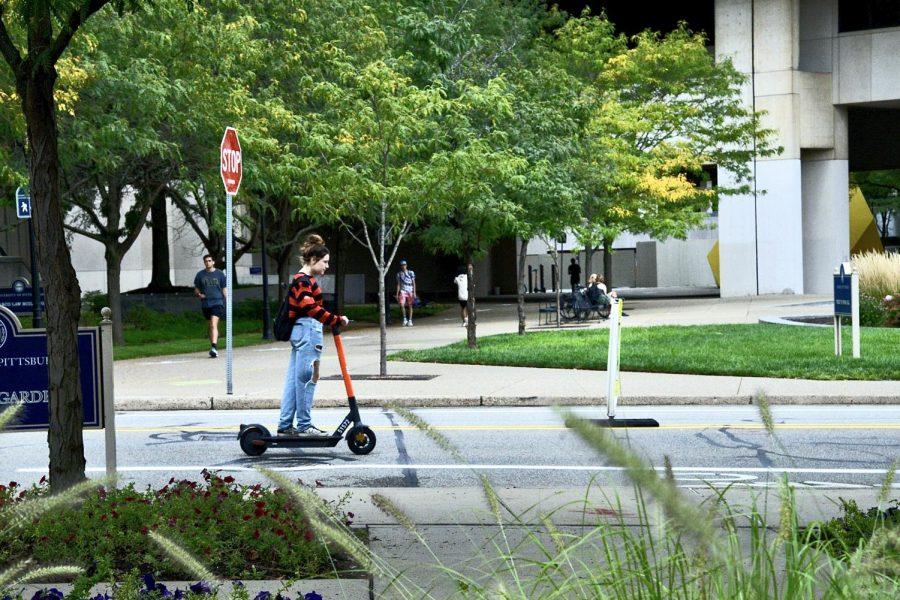Opinion | Spin scooters are an accident waiting to happen
Aauish Jain | Staff Photographer
A student rides a Spin scooter on campus in September.
January 28, 2022
Spin scooters arrived in Pittsburgh less than a year ago as a flashy new mode of transportation. They’re bright orange, electric and users can take them almost anywhere within the confines of the City. They can also be located and conveniently rented through a smartphone app. What’s not to love?
Unfortunately, a lot of things.
The scooters just celebrated their six-month anniversary on Jan. 9 and are already posing numerous problems throughout the City. The main issue with the Spin program is its reliance on an honor system. Spin users must be 18 years of age and have a valid driver’s license. They also must take a basic knowledge test to ensure that they aren’t under the influence and are considerate of where they park the scooters — not in places where roads or sidewalks are blocked.
If you take a glimpse at how some of these scooters are parked around the City, you would know that some people don’t treat communal items properly. If something is for public use it’s generally a good idea to leave it better than you found it, even if others don’t practice this principle. Thankfully Spin recognizes this, but the City is still receiving complaints about the scooters and Spin continues to issue many warnings to users.
Someone can follow these rules to a T and still be put in a dangerous situation because of Pittsburgh’s street layout. Generally, Spin scooters are restricted in places with high pedestrian and vehicular traffic. They have to be parked in places where they won’t get in the way — so, not in the middle of bike lanes, streets or sidewalks. Although there are areas where the scooters are restricted, riders have still managed to end up in places such as inside the Liberty Tunnel.
Spin directs users to ride their scooters in bike lanes — never on sidewalks. On some streets there either is no bike lane or it might be dangerous to ride in the bike lane. Spin can only do so much with their guidelines so that users can safely navigate around the City — the other part of promoting Spin scooter safety must come from the City itself. The City has outlined stricter regulations for who can ride these scooters, their speed limit and where riders can park them. All things considered, this is a step in the right direction for Spin safety, but the issue of safety is multifaceted.
As far as vandalism goes, the three rivers in Pittsburgh could attract Spin scooter vandals. Across the nation, similar electric scooter programs are losing their stock to bodies of water. Vandals will be vandals, but unfortunately these scooters are small enough to pick up and throw into a river, ruining the experience for everyone.
There are some measures to mitigate vandals, though. While vandalism might not seem to affect anyone but Spin and the City, it still affects public perception of the neighborhood. These scooters can be fun, but people need to set good examples to have a functioning program that isn’t a nightmare or just a general eye sore. For example, Spin requires a picture of the parked scooter within the app after the rider is done using it. Any scooter that is parked precariously will land the user with a fine. However, this picture system doesn’t stop accidents that can occur after a rider is done using a scooter and it is laying idle until another rider rents it. After all, accidents happen and gravity isn’t always in our favor.
DUIs are another basis for concern regarding the Spin scooters. Although the scooters can be expensive, they sometimes look like a better option compared to expensive ridesharing apps and buses late on a Friday or Saturday night. Intoxicated people might consider these scooters a dangerously exciting way to get home. There are methods to lessen this impulse, such as forcing riders to assess their intoxication levels before renting a scooter through a series of puzzles, but they don’t necessarily prevent drunk riders. It’s better than nothing, but people will still lie if they have the need to.
Spin puts a lot of trust into its users and I think that’s exactly where they go wrong. About three months after the scooters’ initial rollout in Pittsburgh, Dan Shoman, Spin’s Pennsylvania general manager, said in reference to safety concerns, “We rarely see it get past the first or second warning as that educational piece kind of kicks in.”
I’m not suggesting a breathalyzer on every scooter or an official test at the DMV — I don’t think that would be sensible or sanitary. However, it is worth noting that both the Spin knowledge test and sobriety check aren’t particularly complicated.
As of right now, I think the most comparable transportation system to the Spin scooters is Healthy Ride. Healthy Ride is a communal bike program where users can retrieve bikes from parking stations and travel around the City for a fee. For one, Healthy Ride solves the problem of accidental damages and parking issues outright with designated parking stations that have to be unlocked with an account.
While this might limit mobility in regards to how close a parking station is to your final destination and still fails to solve the issue of DUIs, Healthy Ride has been around for quite some time and has become a well-established resource in Pittsburgh. These two modes of transportation might have vastly different learning curves considering one is a stand-up electric scooter and the other is a sitting manual bicycle, but I think Spin has a lot to learn from Healthy Ride.
I want to stress that hope is not lost for the Spin scooters, and I think Pittsburgh can greatly benefit from this new technology. However, this program is only in its infancy and we are going to have to make changes in order to learn, grow and ultimately better serve the community.
Jessica Snyder primarily writes about controversy in art and politics. Write to her at [email protected].




